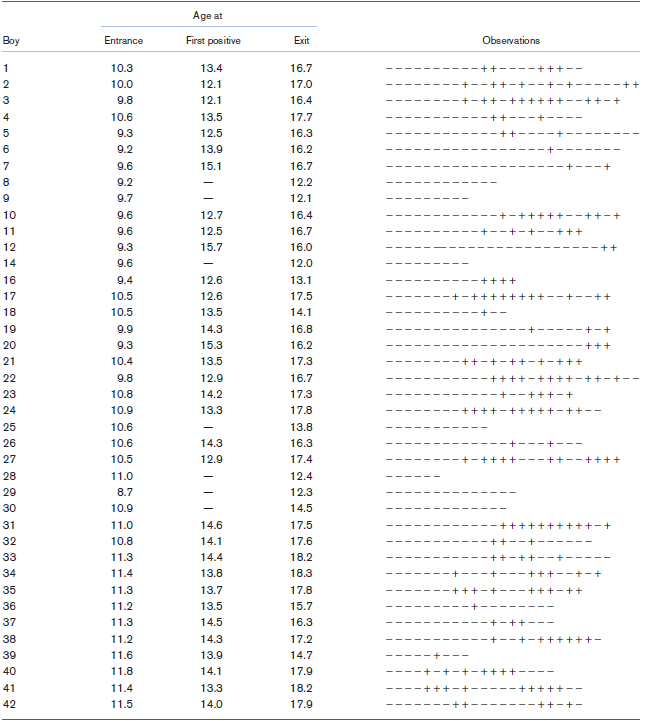Question:
If we assume that all boys have no sperm cells at age 11 (11.0 years) and all have sperm cells at age 18, then estimate the probability of first developing sperm cells at ages 12 (i.e., between 12.0 and 12.9 years), 13, 14, 15, 16, and 17?
Pediatrics, Endocrinology
A study was performed among 40 boys in a school in Edinburgh to look at the presence of spermatozoa in urine samples according to age [15]. The boys entered the study at 8ˆ’11 years of age and left the study at 12ˆ’18 years of age. A 24-hour urine sample was supplied every 3 months by each boy. Table 10.28 gives the presence or absence of sperm cells in the urine samples for each boy together with the ages at entrance and exit of the study and the age at the first sperm-positive urine sample.
For all parts of this question, exclude boys who exited this study without 1 sperm-positive urine sample (i.e., boys 8, 9, 14, 25, 28, 29, 30).
Table 10.28: Presence (+) or absence (ˆ’) of spermatazoa in consecutive urine samples for all boys; age at first collected urine sample, at first positive, and at last sample

Transcribed Image Text:
Age at Boy First positive Observations Entrance Exit 10.3 13.4 16.7 -++----+++-- 10.0 12.1 17.0 ---++-+ +-+-----++ 12.1 9.8 16.4 +-+- ++ ++--++-+ 10.6 17.7 13.5 ---- 12.5 9.3 16.3 16.2 9.2 13.9 9.6 15.1 16.7 +---+ 9.2 12.2 9.7 12.1 10 9.6 12.7 16.4 -+++++--++-+ 11 9.6 12.5 16.7 +--+-+--+++ 12 9.3 15.7 16.0 --++ 14 9.6 12.0 16 9.4 12.6 13.1 -++++ 17 10.5 12.6 17.5 ++++++--+--++ 18 10.5 13.5 14.1 19 9.9 14.3 16.8 -+-+ 15.3 9.3 16.2 -+++ 21 10.4 13.5 17.3 ++-+-++-+-+++ 12.9 16.7 22 9.8 ++++-++++-++-+-- 23 10.8 14.2 17.3 ---+-- +++-+ 24 10.9 13.3 17.8 +++- -+++++-++-- 25 10.6 13.8 10.6 26 14.3 16.3 ---+---+--- - ++++---++--++++ 27 10.5 12.9 17.4 28 11.0 12.4 29 8.7 12.3 30 10.9 14.5 31 11.0 14.6 17.5 ++++++++++-+ 17.6 32 10.8 14.1 --++- -+--- --- 33 11.3 14.4 18.2 -----++-++--+----- 34 11.4 13.8 18.3 --+---+---+++--+-+ 35 11.3 13.7 17.8 -+++-+---+++-++ 36 11.2 13.5 15.7 ---- --- - 37 11.3 14.5 16.3 -+-++--- 17.2 38 11.2 14.3 +++++++- 11.6 13.9 39 14.7 --+--- 11.8 40 14.1 17.9 - +-+-+-++++---- 13.3 11.4 18.2 --+++-+--- -+++++-- 17.9 42 11.5 14.0 --++ ----++-+- + +i i +i







